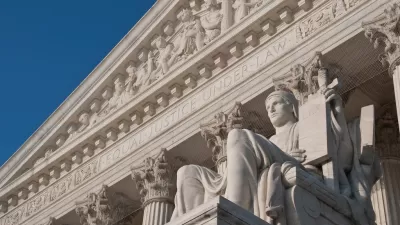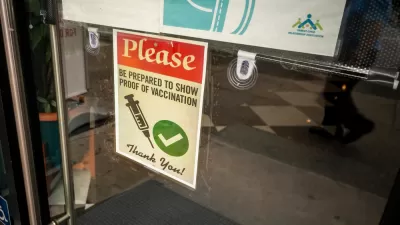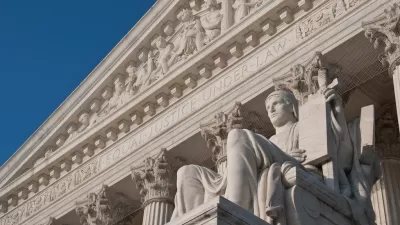The decision in Knick v. Township of Scott prompted a response from the American Planning Association.

A ruling last week from the U.S. Supreme Court in the case Knick v. Township of Scott inspired national news coverage of the ongoing ideological battle on the highest court in the land, also prompting a statement from the American Planning Association that expressed disappointment with the decision.
"The Supreme Court’s liberal and conservative members clashed again Friday [June 21, 2019] on respecting the court’s precedents, this time about when a property owner aggrieved by a local government’s restriction on her land can go to federal court," reports Robert Barnes for The Washington Post.
The 5-4 decision overturned a ruling from 1985 that the "conservative legal establishment" had targeted for reform because it "left property owners without options in federal court if claims in state proceedings are unsatisfactory."
Barnes mostly focuses on the concern among liberal members of the Supreme Court that this case is another example of willingness of the current court to overthrow precedent. Another article by Arianne de Vogue for CNN also focuses on those dynamics of the Supreme Court after the surprise election of Donald Trump.
The American Planning Association picked up on the planning related consequences of the decision, with a statement published online and shared on social media. The state reads, in part:
The American Planning Association (APA) is disappointed with the U.S. Supreme Court’s decision today in Knick v. Township of Scott. The decision upends established precedent for addressing takings challenges and poses potential obstacles for important local land use decisions that benefit communities.
Here's more on the potential consequences of the decision:
The potential for frivolous takings claims to clog federal courts and push local governments into undermining important protections for health, environment, safety, and quality of life for all residents is a real possibility after today’s decision.
A soundbite from John Baker, chair of APA’s Amicus Curiae Committee, is also included in the statement:
“APA urged the Supreme Court to ... decide the case based on existing legal principles, while at the same time clarifying those principles so as to curb their abuses,” said John Baker, chair of APA’s Amicus Curiae Committee. “Instead, by a single vote, the Supreme Court took a meat-ax approach, explicitly overturning a 7-1 decision from 1985 and trivializing language in the Court’s own decisions dating back over 125 years.”
FULL STORY: Supreme Court Overturns Longstanding Property Takings Precedent

Planetizen Federal Action Tracker
A weekly monitor of how Trump’s orders and actions are impacting planners and planning in America.

Map: Where Senate Republicans Want to Sell Your Public Lands
For public land advocates, the Senate Republicans’ proposal to sell millions of acres of public land in the West is “the biggest fight of their careers.”

Restaurant Patios Were a Pandemic Win — Why Were They so Hard to Keep?
Social distancing requirements and changes in travel patterns prompted cities to pilot new uses for street and sidewalk space. Then it got complicated.

California Homeless Arrests, Citations Spike After Ruling
An investigation reveals that anti-homeless actions increased up to 500% after Grants Pass v. Johnson — even in cities claiming no policy change.

Albuquerque Route 66 Motels Become Affordable Housing
A $4 million city fund is incentivizing developers to breathe new life into derelict midcentury motels.

DC Area County Eliminates Bus Fares
Montgomery County joins a growing trend of making transit free.
Urban Design for Planners 1: Software Tools
This six-course series explores essential urban design concepts using open source software and equips planners with the tools they need to participate fully in the urban design process.
Planning for Universal Design
Learn the tools for implementing Universal Design in planning regulations.
Heyer Gruel & Associates PA
JM Goldson LLC
Custer County Colorado
City of Camden Redevelopment Agency
City of Astoria
Transportation Research & Education Center (TREC) at Portland State University
Camden Redevelopment Agency
City of Claremont
Municipality of Princeton (NJ)





























